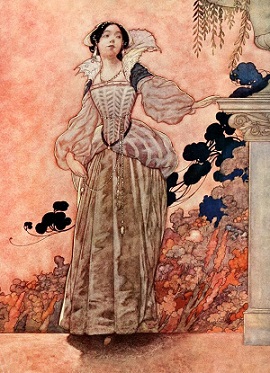| SONNET 145 |
PARAPHRASE |
| Those lips that Love's own hand did make |
Those lips of my mistress, made by the hand of Venus herself |
| Breath'd forth the sound that said 'I hate' |
Said "I hate" |
| To me that languish'd for her sake; |
To me, who pined for her love; |
| But when she saw my woeful state, |
But when she saw my pitiful state, |
| Straight in her heart did mercy come, |
Immediately in her heart she felt mercy, |
| Chiding that tongue that ever sweet |
Softening her sweet tongue |
| Was us'd in giving gentle doom; |
That was otherwise not too harsh; |
| And taught it thus anew to greet: |
And teaching that tongue to speak to me in a new loving way: |
| 'I hate' she alter'd with an end, |
By adding words to the end of 'I hate' |
| That follow'd it as gentle day |
Those words that she added followed like a gentle day |
| Doth follow night, who like a fiend |
Follows night, who like a devil |
| From heaven to hell is flown away; |
Flies away from heaven to hell; |
| 'I hate' from hate away she threw, |
'I hate' she separated from hate, |
| And sav'd my life, saying -- 'not you.' |
And she saved my life by adding -- 'not you'. |
